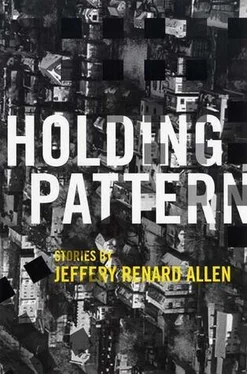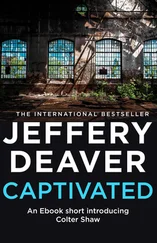Jeffery Renard Allen
Holding Pattern: Stories
for
Elijah, Jewel, and Sophia — heart of my heart
Special thanks to the Whiting Foundation, Creative Capital, and the Dorothy and Lewis B. Cullman Center for Scholars and Writers at the New York Public Library for their generous support
The land may be spoiled, yet it will remain intact.
— DINKA PROVERB
Note: Though the name Hatch appears in many of the stories that follow, the reader should not assume that this name represents a single, reappearing character.
I hear my train a comin.
— JIMI HENDRIX
Black flutter, Mamma flashed about the room, workbound, her shiny knee-length black leather boots working against the wood floor like powerful pistons. Up, down, up, down. She stopped and looked at the space around her. I have everything, she said. The hem ends of her long black dress flared like wings.
Yes, you do, Hatch said. He waited patiently on the bed edge, warm, his snowsuit packing him tight in heat and sweat, all of him sausaged inside puffy outer skin.
She put herself before a full-length mirror, flexed a black hat onto her plump head, and slipped inside a black fur coat. The hat was real fur, but the coat, some imitation material.
You look dashing, he said.
Thank you.
He watched her with hot pride. She was heavyset but pretty. Even with her second chin, she was ten times prettier than the mother of any classmate at school.
The phone rang on the faded brass nightstand next to the bed. Uh. Who could that be? People always call you at the wrong time. She lifted the receiver to her ear. Hello. Her eyes widened. It’s Blunt, she said.
Oh, he said. My grandmother. He didn’t like his grandmother.
You must go to work, he said. Tell her. Be frank.
Words chirped in the earpiece. Mamma brightened. The preacher’s dead, she said.
Oh, he said.
The preacher’s dead.
That’s good, he said.
She gave him a hard look. Placed her hand over the mouthpiece. Don’t get smart.
He didn’t say anything.
Put those things in Mamma’s bag, she said.
A small duffel bag lay unopened on the bed.
Okay, he said. He picked up her rubber gloves, pulled the fingers, and let them snap.
She looked at him. You know not to make noise when I’m on the phone.
Fine. He crammed the gloves, a white smock, white rubber-soled shoes, deodorant, and a bar of soap into the bag, which spread at the sides, stuffed like a holiday turkey.
Yes, Blunt, Mamma said. Okay, Blunt. I understand.
Blunt and the preacher lived in New York City, in Harlem, point of origin for a nationwide chain of funeral homes. Just around the corner from where Hatch lived, a Progressive Funeral Home entombed an entire street, the name spelled out in square orange blocks lit from inside, like supermarket letters. A man-high wrought-iron fence surrounded and secured the parking lot, four redbrick columns for corners, each topped with a white globe at the end of a long stem-slim black metal pole.
Blunt and the preacher own that, Mamma liked to say.
Yes, Blunt. My grandmother.
Snooping, he had found two other Progressive Funeral Homes listed in the local telephone directory.
Name and deed, Blunt traveled through his mind like some inky substance. He had never spied photograph the first — Mamma had burned all existing images many years before he was born — or heard her voice. Once a month, Mamma mailed Blunt a letter with his most recent portrait, and Blunt mailed her a letter — typed, always typed — with a check.
Why doesn’t Blunt send us more money?
She sends all she can.
How much is that?
Whatever she sends.
Fine.
Good-bye, Blunt, Mamma said. She hung up the phone. Turned to Hatch. Smiled. Hatch, come here.
What? he said.
Come over here to Mamma.
Is this something frank?
Yes.
What?
Blunt’s coming to live with us.
Nawl.
Don’t use that street language.
I’m not.
Choose your words carefully.
Who’s coming to live with us?
Blunt.
My grandmother?
Yes.
Why is she coming to live with us?
Because the preacher’s dead.
So?
The preacher’s dead, so now she can come live with us.
How come she didn’t come live with us when the preacher was alive?
You know why.
No, I don’t.
Don’t talk back. And don’t talk countrified.
How come she never visited us?
You know why.
I don’t know why. Tell me. Be frank. Good people are always frank.
I am being frank.
You ain’t.
Watch your language and stop talking back.
I ain’t talkin back.
Mind your mouth.
How did the preacher die?
Suddenly.
Oh.
You know that the preacher had a bad heart.
Who had a bad heart?
Be a good boy for Mamma.
I am being good.
Then we’ll let Blunt stay in your room when she comes.
Nawl. I don’t want her around me. He liked his small room, high above the world, a third-story nest to which he flew for refuge.
We’re going to move your things into my room so that Blunt can put her things in your room.
Nawl.
It’ll only be for a little while. Blunt has lots of money now, and she wants to buy us a house, and we’ll all live together, and you’ll have a big room.
She lyin.
Watch your mouth. You get worse every day.
I do not.
And stop talking back.
He said nothing.
You can sleep in my room when she comes.
Nawl. I’ll sleep in the kitchen if she comes.
What did I tell you about talking back?
I’m not talking back.
She is coming.
Fine.
Okay?
Fine.
You’ll be a good boy for Mamma when she comes?
Fine.
She knows how smart you are.
Fine.
The train screeched around the curve, the passengers firm and erect in their seats like eggs in a carton. Hatch checked flight conditions. The El was a strong, sprawling nest erected over the city. Safe, Mamma beside him, he looked down on the world far below. Wormlike people wiggled through snow. Habit, they often rode like this, all day on Sundays. Mamma wanted him to memorize every route. He would touch the map like his skin.
Car to car, the train pulled into the station, a flock of magnetic migratory birds. They quit the bright metal insides and, hand in hand, pushed through the rushing crowd. His snowsuited legs rubbed together and made a noise like that of an emery board against fingernails. He kept his eyes low, sighting varied shoes and boots flopping like fish across the wet concrete floor, his blind forehead colliding with belted or fitted waists. His sight lifted to bright lights perched, pigeonlike, in the high conical roof.
Some fabled creature waited near the checkpoint to gate 12. Human, beast, and fowl. Feathery white mink hat and coat, red amphibian jumpsuit (leather? plastic?), and knee-length alligator boots. She was tall and wide like a man, and carried a white suitcase in one hand, a black guitar case in the other.
Mamma swallowed. That’s Blunt, she said.
The creature called Blunt spotted Mamma and strode forward without hesitation, strode full of life. She halted two feet shy of them and set down the suitcase and the guitar case with equal care. Extended her hand. It was big. Mamma took the big hand into her own.
Hello, Joy, Blunt said.
Hello, Blunt, Mamma said.
Blunt released Mamma’s hand. Seemed to think twice about it and gave Mamma a quick peck on the cheek. Studied Hatch. So this is my little Hatch, she said.
Читать дальше












